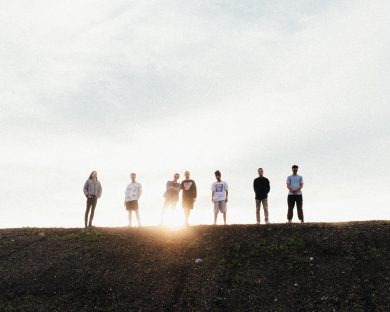The jazz rap sextet Original Gros Bonnet’s second album wasn’t called Tous les jours printemps (Spring Every Day) out of wishful thinking, but because those words express the conviction of the 2019 Francouvertes-winning band (under the O.G.B. acronym) that its future will be marked by constant change, and a belief that the best is yet to come.
“In this particular case, Spring is something inevitable,” says frontman François Marceau (a.k.a. Franky Fade). “It represents a birth, a re-birth. It’s both an annual and a daily cycle. One must accept that fact to be able to enjoy and celebrate it – instead of just going through it,”
“It’s also a portrait of our ambition,” says the album’s producer and chief arranger, Samuel Brais-Germain. “It’s a positive spin on our concept of hustling, of the work we have to do to achieve our goals.”
At the centre of the album concept is the theme of blooming. On “Watch a Flower Bloom,” the blooming image closely reflects the feeling the young rapper was experiencing while the album was being written. “A flower blooms slowly,” he says. “It’s not perceptible, but it opens up for real. You must accept the fact that evolution takes time.”
For something as fragile as a flower, evolution isn’t always obvious, or even guaranteed. Hence the rapper’s anxiety on tracks like “Sous stress” and “Jusqu’au noyau.” “I have a fear-ridden relationship with the idea of success,” says Marceau. “I’m sometimes afraid that success might end up destroying me. We’ve seen so many people reach the top, and eventually crash. That’s why I’m forever asking myself what it is that I really want. I don’t tend to make my best decisions under pressure. I must deal with my habit of questioning everything on a daily basis.”
While doubts have fed Marceau’s verses, they didn’t interfere with the producer’s writing sessions with five other band members: John Henry Angrignon on guitar, Vincent Favreau on piano, Vincent Bolduc-Boulianne on bass, Louis René on drums, and Arnaud Castonguay on sax. All former students of the Saint-Laurent Cégep music program, and friends for many years, these musicians are proving on Tous les jours printemps that they can play their respective instruments masterfully, and – by combining their strengths – also create songs that are as impressive as they are daring and concise.
Two creative residencies have had an especially beneficial impact on these seven jazz lovers, who all had an epiphany a few years back when they heard Kendrick Lamar’s To Pimp a Butterfly, an album that sparked their love for rap music. One of these residencies took place in October 2019 in a cottage near Castor Lake in Saint-Paulin, Québec. “We stayed out there for five days, and it was gorgeous,” says Marceau. “We had purchased a large portable console, and we set it up to record everything we were playing. As soon as we came up with a good idea, we listened to the takes again. We then had meetings to decide who would play what part. But we also set aside free periods for chilling out, canoeing and having fun. We mixed business with pleasure.”
Recorded right before the pandemic at Montreal’s Madame Wood et Dandurand studios, Tous les jours printemps also included sessions with a string quartet and a wind instrument section, besides the participation of the rapper Jam (on “Ballade”), and the expertise of sound engineer and mixer Manuel Marie.
 In short, as Marceau mentions on “Jusqu’au noyau,” the band “went all out” with this work, the proud successor to their Volume Un (2018) album, and their Original Gros Bonnet (2017), and Fruit Jazz (2018) EPs. “We refused to cut anything out. As soon as we came up with an idea, we took it to the limit,” says saxophonist Arnaud Castonguay. “But hey, we were obviously able to do this thanks to the grants we received and the awards we won, including as part of Les Francouvertes.”
In short, as Marceau mentions on “Jusqu’au noyau,” the band “went all out” with this work, the proud successor to their Volume Un (2018) album, and their Original Gros Bonnet (2017), and Fruit Jazz (2018) EPs. “We refused to cut anything out. As soon as we came up with an idea, we took it to the limit,” says saxophonist Arnaud Castonguay. “But hey, we were obviously able to do this thanks to the grants we received and the awards we won, including as part of Les Francouvertes.”
“Well, it won’t be the same with our next release. The cover will have to be designed on Paint,” producer Samuel Brais-Germain adds with a laugh.
With a seven-member band, going all out means a well balanced blending of everyone’s tastes and influences. This time, the band opted for a tribute to the atmospheres of film scores by such distinguished composers as Quincy Jones and Henri Mancini, rather than Kendrick’s. Their shared love for Tyler, The Creator, Playboi Carti, and PNL also coloured their creative work, which brought about an esthetic shift that’s particularly noticeable in the more harmonic and atmospheric use of Marceau’s voice on some tracks.
“It wasn’t done consciously, but yes, my voice is sounding a little bit more like an instrument [than normally],” says Marceau. “Before that, I was more interested in performing lyrics, but now, I’m feeling them more deeply. I think that the result is more genuine, and that the voice blends with the music better.” He adds that, this time, he made a conscious choice to do way with the Frenglish: “I wanted to get closer to O.G.B.’s origins and esthetic makeup. And we all grew up speaking French.”
So, for Original Gros Bonnet, consensus trumps compromise. “If you want everybody to be pleased with the album, you can’t aim for a vibe that is overly electro, or too commercial,” says Brais-Germain. “You can’t be moving to a [niche] sound like that. We have to go for music that reflects us.”